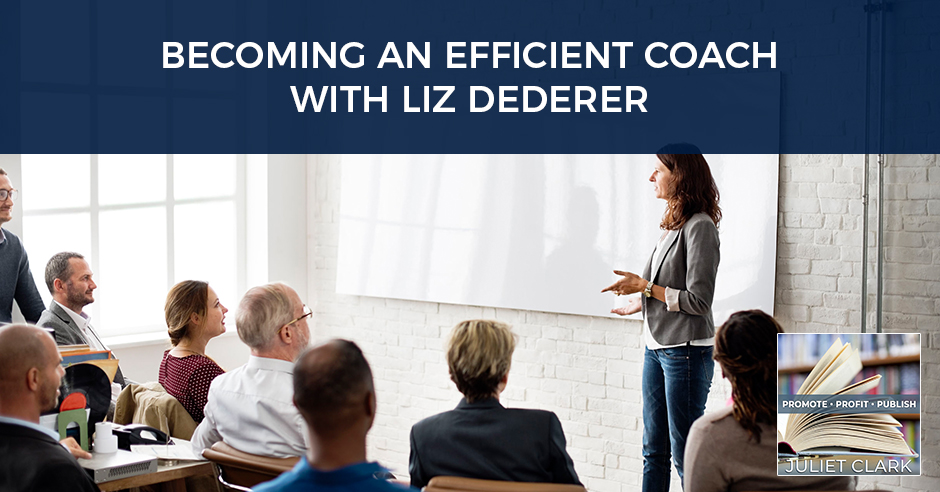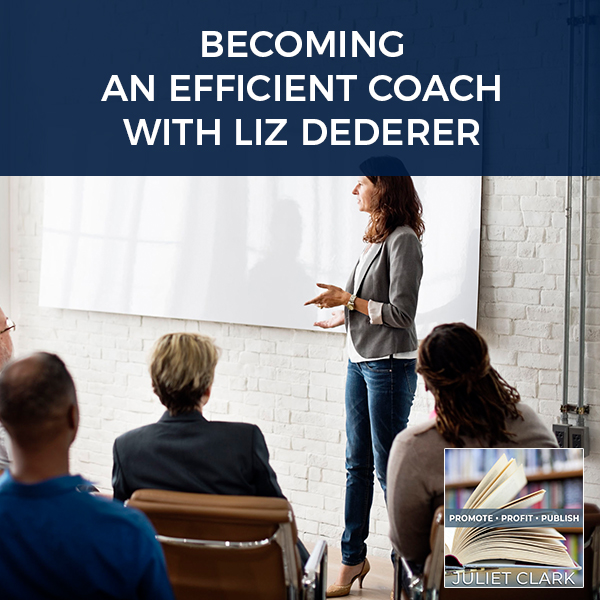
—
Watch the episode here:
Listen to the podcast here:
Becoming An Efficient Coach with Liz Dederer
We have a fantastic guest. She is someone who I met and we had one of the most transparent conversations about what’s going on in the coaching industry than I’ve had in a long time. It was down, dirty and truthful and we’re going to share that with you. My guest is Liz Dederer. She is the Founder and CEO of Selling With Service. In addition to turning around a sales team from under $300,000 to $1.2 million in six months, her company has helped clients increase close rates from 0% to 80% in 30 days, end of the year 50% over the plan and triple top line sales in under three years. Prior to founding her company in 2011, Liz created training programs and executive sales plans for international retailers as well as developed growth strategies for startup, turnaround and high growth venture capital-backed companies.
In 2015, Liz was on a national speaking tour empowering thousands of women across the country on the topics of sales and money. Always one to give back, she has lent her talent and expertise to SCORE, the Women’s Business Development Council and has taught several entrepreneurial classes on various nonprofits. Additionally, she was the Director of Communications for the first of now three Connecticut Chapters of the eWomenNetwork, which also was the fastest growing chapter in the organization’s then fifteen-year history. She has been featured on the International Women and Money Summit, spoken across the country using The Four Currencies of Conversation empowering professionals to close clients quickly. Welcome, Liz.
Thank you for having me, Juliet. This is so exciting.
When we were speaking, I was so impressed. Most people aren’t willing to talk about the coaching industry that has developed in a truthful way. One of the things that you and I talked about was how online marketing in this world has made this look like it’s glamorous. People walking around with cameras saying, “Look at my house, look at my car, look at my happy family, which we know from social media, everybody does every anyway. I want to talk about the problems we discussed out a little bit and the problems that new coaches encounter and how we can save them at least $10,000 on this show.
At a minimum, it’s $10,000. We connected and the energy started flowing. One of us brought up the topic.
I want you to talk about online marketing because one of the things that I am facing with a lot of my clients is they have spent hundreds of thousands of dollars on coaches that haven’t gotten them anywhere. The real crux of what I do in my program is let’s get down and make this a real business and connect with your real consumer. Tell us about what you see online that doesn’t help coaches.
What I see a lot of them doing are trying to be like the next shiny one in front of them. It’s like this perpetual game of dress up. Building the next website and revamping their copy and trying the next social thing. Jumping onto Snapchat, Instagram or Facebook and trying all of these tactic, business busy work things. If we boil it down and pull it backward, what happens is we’re trained as employees. That’s how we’re conditioned growing up. Then we decided to step into our own business, whatever that transition is for us. What we do instinctually is we sit at our desk from 9 to 5 and as long as we’re busy, then we think we’re doing business and it’s two very different things.

Efficient Coach: Everything should be client led. If someone gives you money, you need to listen to everything that they say.
Doing Facebook, connecting with people, liking other people’s posts, starting the free group and giving the free giveaway and all of these other things, it’s so time-consuming. Nowhere in that equation does it answer the question, what problem are you solving for whom? When are you going to say speak to them? They’re putting money into websites. They’re putting money into Hootsuite or Edgar and all of these different things. I’m not bashing any technology. I’m not saying that you shouldn’t have a website. I’m not saying any of that.
What I am saying is that your business should be paying for that as a result of your clients, the people who are giving you money, telling you what they want you to do for them. Everything should be client-led. If someone gives you money, you need to listen to everything that they say. You need to take notes on every conversation. You need to record every interaction and you need to figure out, “What did I do to get them,” and now I just need one more of them. You go get one more of them. We try to scale before we have anything to sell because we think that’s what we should be doing. It doesn’t work that way.
In the expense of that, The Four Currencies of Conversation, I look at time, not just money as the quantifier. There’s time, energy, money and people. You will run the road to burn out on all four of those currencies so fast building the house from the outside before you’ve built the foundation, before you’ve tested that land to see if it’s smart. I see people decorating the bathroom before they’ve even picked out a plot of land to build their business on. What I mean by that in the internet marketing world is they’re updating their website or having another glam photo shoot and putting it on Instagram for their 25 followers. They still haven’t identified who the person is that they’re solving what specific problem for.
One of the things that we talked about is the life coach things. Many people are like, “I’ve taken a certification to be a life coach. Now, I’m positioning myself as a life coach.” We did a study because we had a client who was a life coach who didn’t believe that people have a poor connotation when it comes to the word life coach. I don’t know if you’re married but when I was married, my husband would try to tell me how to play golf. It was like, “No.” I think that life coach is this ambiguous term that nobody knows what they do. Nobody knows what problem they solve, exactly what you’re talking. Those people are floundering because they don’t have that message.
Here’s the thing, if it’s not broken, don’t fix it. If someone out there is calling themselves a life coach and they’re reading this and are like, “It works. I’m running a six-figure company and a seven-figure business and everything else,” then that’s great. That works for you. You’ve done other things to put the pieces in place. Generally speaking, hanging that, “I’m open as a life coach” sign on your proverbial front door is not what’s going to make the cash register ring. It’s your speaking to people versus listening to what it is that they’re telling you that they want from you.
Everything that the online coaching coaches do is a very calculated distraction from the actual one thing that we all need to be doing. It is what you and I did, which is what brought us here, which is picking up our broken cell phones that we always drop and having a conversation. This is the only thing. Mine is, “Look at this thing, it’s horrendous.” This is what makes the money. This is what makes the cash register ring. This is what keeps the lights on. Calling yourself a life coach does not mean that you are a business professional. It does not mean that you know how to run a company. You might be able to crack through somebody’s stuff, you might be able to help them and that’s great, but not if you can’t help yourself.
If it's not broken, don't fix it. Share on XLet’s talk a little bit about that. We have all this busy work. We’re busy off with these coaches that are talking about, “You need an online funnel.” The reality is what you said, that online funnel may bring people into awareness of you but without those conversations, you will never sell a big-ticket program. How much of everybody’s day are they creating income-producing activities for their company?
It’s falling into the business busy work. I need online funnels so then I have to get Infusionsoft or ActiveCampaign or MailChimp and then I have to learn that. Now, I have to go do that. We’re becoming like internet marketing people versus CEOs of the company. The only job is to pick up the phone and call one person. We think that that’s one person that’s not going to do anything. I need to have a big business. I need to have all that. All of these tools, tactics, strategies and whatever are amplifiers and multipliers of a very diluted message. You build as one of my mentors calls it the Willy Wonka machine. You build this big complex factory with all these moving bits and pieces, all these online widgets to blast out this life coach message or “I’m a coach now or I’m a business coach,” or whatever that happens to be. It’s shouting into the abyss. You fall on deaf ears. There’s a phrase I love that, “When you’re talking to everyone, you’re talking to no one.” Nobody wants to hear a dull, diluted, generic message. They want to hear that you are specifically speaking to them. You are a specific person. You can speak their language.
The fear comes in narrowing it down. If I only focused on going after Sam, then I’m losing out on all these people. If I only focused on going after Sam, Sam is going to give me money to help her because I know how to help her. Sam is going to hang out with other Sams. Sam is going to introduce me to the next one who’s going to introduce me to the next one and the next thing you know I have a few people that I’m doing a few different things for. I’m starting to find out what I like to do, what I don’t like to do and I’m getting paid to do market research in my own business. I’m listening to how the clients are talking about the work that we’re doing together. They’re telling me what I should call my business. They’re telling me what my tagline is. They’re telling me their problem in their language. Now, I have something to amplify to go find more Sams. The only way that starts is by picking up our little broken phones and having that conversation with one person and saying, “Who do you know that might possibly maybe fit this description?”
We have that software we use with assessment marketing and that is the point of it. Digital marketing will only get you so far if you don’t pick up that phone and have that conversation. The assessment shows you what these people are struggling with. Otherwise, you’re guessing at the whole thing. If you were someone who had to go out and get capital, do a capital raise, these are all the things. Nobody is going to give you money to run this business until you can tell them all the things we’ve been talking about. Who is that ideal client? Have you validated that audience? Are they there? We come back to why would you spend your own money on something that somebody else wouldn’t invest in you for?
I have to go on a side tangent because you struck a chord with me about women self-funding and men getting funding. I have found in my several years running my company and in the multiple years prior to that I was working with Venture Capital companies that were investing in growth firms, were building their senior leadership teams. This whole funding threat has always been in the background. What I found when I came into the coaching world that I took to be normal because that’s what I found, normal doesn’t mean right, is that women, not all but generally speaking, will self-fund or bootstrap. Men will look for an investor. Men will look for a sponsor. Men will look for somebody to oversee the influx of cash. Women will think we have to do it all ourselves.
Why is this? I haven’t done that. I’m not a researcher. It’s the nurturer. It’s who we are. We’re not taught to ask for money. If you look at the reality of money, literally it’s only since 1988 that women can get a loan for themselves without a man as a co-signer. That might have a little bit to do with it. Literally, we’ve not been allowed to ask for money by ourselves. The reality is that even now, we still have this conditioned vibe within us that’s like, “Don’t ask for money.” This trickles into the work that we’re ultimately doing with and for clients and what that’s looking like and how many people are stepping into, “I don’t have a paid client yet so I can’t ask for money.” This whole money thing comes up where they think they have to work for free to prove themselves and that financial switch never gets turned on. They end up draining themselves financially. Now they’re broken, depleted. Those four currencies: time, energy, money and people, they’re done. They’re completely wiped out.

Efficient Coach: There’s nothing more expensive in your business than a wrong-fit client.
They go back into the corporate world as a more broken version of themselves. I have been in this for seven years. I’ve seen this time and time again. I have a little opinion about it. I’m slightly passionate about it. I feel so sort away. My little tangent is when we acknowledge our relationship with money and that we have one and that nobody is fully healthy, but that’s what it ultimately is that’s holding us back. We don’t phone to call someone. It’s not because “What if they say no?” We know they’re going to say no. We know how to handle that. We can handle rejection of all sorts of things like equal wages, governing our own bodies. We deal with rejection all day long.
What we can’t deal with rejection or acceptance with is what happens if and when they say, “Yes?” If we’re going to invest in any online technology: PayPal, Square, Stripe, something where you can process a credit card. Sign up with one of those things, get the app on your phone, run your own credit card for a dollar so you know that it works. Get on the phone with someone and have a conversation around what problem you can solve for them specifically at what dollar amount. You’re going to lose your shirt. You’re going to say a number that comes out of your head, they’re going to say, “Yes.” You’re like, “Okay.” As soon as they say yes, that’s a clue. I should have said more. The next conversation you have, you’ll say more. That’s how you grow your business.
I don’t know if I’ve ever shared this before, but I put out and I pitched a $25,000 program. I stuttered. When I gave them the price, it stuttered on the way out of my mouth. I did some work around my scarcity on that. What happened? I don’t stutter but it happens a lot. Another thing I see out there with women and this happened with one of my clients. She called me and said, “I only have five people sign up for my program. Should I give it for free for 30 days or have them pay and give them?” I was like, “No, those are your five people. Don’t go out and lower.” I always feel like if you give something for free or every time you try to make a deal with a client, like give them something good, it blows back in your face because it’s bad karma for your money flow.
It’s doing it from the scarcity and lack perspective versus from an abundance perspective. I have no problem over delivering. I joke that I’ll move into a client’s house and I’ll do their laundry alongside while we’re working on this. I have no problem to a fault over-delivering, but it is from an abundance perspective knowing that two plus two equals five. We’re going to double down and we’re going to get more for what we’re putting in versus, “I’m afraid that they won’t like me.” Every time that happens, I get a wrong fit client. There’s nothing more expensive in your business than a wrong fit client.
The other thing that happens there is that once we do that, we’re devaluating who we are and what we do. We’re going to bring more of the same there. You have to stand up and be able to say, “This is what I charge.” The benefit of that when you’re saying the two plus two equals five is that I’ve been able to transition my business to probably 90% of my business is referral now because of that over delivery and because I’ve stood firm, and not taken on those free or discount clients. It’s funny because I tried to give two people deals and they were rejected. I had to sit there and go, “I do think the universe doesn’t want me to do that anymore,” because that was a good deal. They should have taken it. There are signs that they are against scarcity.
It’s funny because the louder people are in marketing, it’s like the empty drum beats the loudest. The louder the business is online, the louder and shinier things are. It’s not an absolute. There are great companies and great coaches that are very busy and productive online, but you can tell the difference. Is it fluff or is it converting? Being loud online does not translate to being profitable in the backend. Sometimes the most profitable businesses are the ugliest online because they’re not paying attention to that. They’re serving their clients. The 90% is coming from referrals. We made a bold claim in the beginning that we can save somebody $10,000 but let’s quantify that quick. That’s a low-end coach and a website. You don’t need either of those. You’d pick up the phone and have conversations.
You’re in the book business. One of the problems that people have when it comes to books is that they think that’s going to be the thing and it’s not. It’s a piece in the whole puzzle. “If I have a book, if then, if I have Infusionsoft, if I have this, if I have the book, if I have the website then that will solve the problem.” No, they’re amplifiers. If someone has a good message and they’ve done the work to hone in on it, and they know who they’re speaking to. What the problem is that person has and then they’re operating from a place of abundance versus scarcity and they’re saying, “Come with me on this next step,” which is a smart business thing to have a call to action in there to some degree. That book will do well because it was well-positioned and well-researched. The right information went into it versus, “I need to have a book so I can now call myself an author.”
Normal doesn't necessarily mean right. Share on XThat’s one of the things why we developed what we did with the platform building was because people would come to us and the book was the answer. They went to some business writing rah-rah, where the writing coach who is going to make a lot of money from this, told them that your products and services aren’t selling because you don’t have a book and no one knows who you are. We probably don’t publish half the books that are brought to us because we call BS on it. We’re like, “If you have products and services back there that aren’t selling, the book is not the magic bullet.” Everyone thinks the next big thing is the magic bullet that will pull this all together. What it is, is why didn’t those things sell back there? Probably because you didn’t pick up the phone and communicate and find out. When we get invested in a book, it’s because you have spoken to people. It’s the right book. It’s the book people need. Even then we tell them, you’re not going to make a bundle off this book, very few authors do. This is a tool in a vast toolbox.
It’s one brick in the wall, one piece.
There have to be coaches out there like you and me that are willing to call that BS. That are willing to say, “You’re $100,000 in debt now, why? What are the shiny objects you pursued and why didn’t they work?” That’s the question behind all of this. What was your message and why didn’t it work?
The A to B to that is when was the last time you made a sales call? If you’re not picking up the phone and having conversations with people and you’re hiding behind the computer, it is not driving the business. That is not going to make the cash register ring. It’s not to say that online marketing doesn’t work, it does. It takes a significant amount of money to move these engines. There’s clarity. There’s focusing. There’s a refinement of the messages along the way. If you look at like a true online marketing campaign, it can get so nuanced to where you’re understanding it’s because the subject line was too wordy. That’s why it’s not being opened and that’s the one thing you changed. You can’t do that when you’ve got 25 people on your email list for MailChimp.
Fifteen of them aren’t opening.
Three of them are friends and family like, no. I did a masterclass about a few years ago. I teach scripting and sales obviously. I did a one-day masterclass where everyone was creating their script together. In order to generate some buzz for this, I was on a speaking tour, I had existing clients, that’s how I got the speaking tour. All of these different components, all of these different things we’re working and I had people already in my business who were paying me to serve them. I decided, “I’m doing the scripting with the individuals. I wonder if I could do it with a few people.” We literally did a Zoom call. We had their Google Documents open where I was looking at their scripts together. I was like, “This is scalable.” I did it with an existing client. It works. I tested it with a paid Beta group and it worked. I was like, “Let’s take this to the next level.” With a speaking tour, I’m talking to all these people, all these women, all over the country about sales and scripts. On the speaking tour, I only have a little bit of time to give an invitation. The invitation was to the extended version of that training that I was introducing to them. They had to give me their contact information to receive the prerecorded one-hour extended training, which I called Close Clients Quickly. Now, I have their information. I send them the training.

Efficient Coach: If you want to do any online marketing, you need to have a phone number on your opt-in and it’s non-negotiable.
Here’s the part where people fall off and lose money. You put all that into that. Now you’ve got people in the training. They want to over email communicate it to them. What I did is once I sent them the training, then I would pick up the phone and I would call them, “It’s Liz, did you get the training? Did you get a chance to listen to it?” I got it totally, Juliet. The reactions I got from people were hilarious. You could think it was like Beyoncé calling them. They’re like, “It’s you.” I’m like, “Yeah, it’s me.” They were like, “People never call.” I was like, “That’s the point.” It was a one-call outbound close, which is here’s the magic people to your close script is I said, “I know I’m catching you off guard, but now that I have you on the phone knowing that I’m a sales and money coach, what can I do to support you? How can I help you?” They would tell me or they wouldn’t. When they told me, I would say if I could solve their problem right then and there, “Sure, I’ll give it away. That’s awesome.” If I couldn’t, I would say, “I think we need to dive into this a little bit more.” For a couple of people that I spoke to, I said, “The masterclass that we’re doing that we’re going to go through the script, so why don’t you hop into that.” That was a $2,000 price tag. That was a twenty-minute outbound sales call that was closed and done. That is not going to happen from an email.
That’s a good thing people don’t get as well is in digital marketing, we used to be able to sell things on webinars all day long that were $2,000. It doesn’t happen anymore. People have been burned. They’ve had all these things happen where coaches didn’t step into their deliverables or their promises and they’re not going to click anymore. You have to have conversations. What I think is important in that with what you do is not only one conversation, you have to know your close rate. How many conversations does it take you to close on average? For me, if it’s a referral, it’s one to two. If it’s cold, which people don’t know the difference in their traffic either whether it’s cold, medium or cold warm or hot traffic.
If it’s cold traffic, it may take five or six calls to close. You need to know that if you’re going to do cashflow projections, if you’re going to put together an actual budget and know what’s going on. You have to know those statistics. That’s one thing that in all of the income-producing activities that people aren’t doing, they don’t even realize it’s even more refined than picking up that phone. It’s knowing like, “Are you having enrollment conversations that are effective? Have you crafted that whole thing so you’re doing some active listening and finding out what their problem is?” sometimes even if you can’t help. I’ve had people that I’ve said, “I don’t think I can help you. That’s not what I do,” and sending them to somebody who maybe can.
There’s so much in there. We said we were going to save people $10,000. I’m going to do it right now. If you’re out there and you’re talking to people all day long who are not your ideal client, you’re wasting money and time right then and there. If you’re in the back of your computer waiting for people to click, you’re wasting money. It’s not the landing page. It’s not that. It’s you. People are buying you. You have to be out in front of them and not spending money, $25,000, $50,000 on coaches that aren’t doing that for you, that aren’t getting you out there.
If you’re going to spend that money, then you need to hire. You need to co-create your product together. You need to step away. You need to do something else. We talked about the market is so saturated right now. That’s a huge contributor because people are looking at the wrong things. They’re looking at the busy work. They’re looking at the gurus who have built up the tens and hundreds of thousands of followers where those tactics do work. At the ground level, if you want to do any online marketing, you need to have a phone number on your opt-in and it’s non-negotiable. People are going to put in the wrong phone number. What do you do? They get your free PDF and they never use it because that’s their own stuff that’s coming up, fine. The people that do put in the phone number, you need to pick up the phone and call them. That email chain stops. You pick up the phone and you call them. You have a conversation. It’s a give and it’s, “What can I do to help you?”
We don’t give free stuff away anymore. We have our assessment where you have to sit down and self-assess and the phone number is required. There’s co-creation on what you’re creating right then and there because when we did webinars, we would send out that, “Do you hate me?” email at the end to find out why people didn’t buy. We had people telling us that they were going from webinar to webinar to figure out how to do this. I’m going to share something with you right now. I had a great webinar coach and believe me when I tell you the strategy is to give you enough to like us. Go out and use some of our tips. We’re not giving you the way to do this in our webinars. If you’re thinking you’re going to learn that going from webinar to webinar, you’re sorely mistaken.
Even if you were to give it all away, let’s play on the abundance hypothetical. You give it all away. Here’s the webinar. I’m going to teach you everything. You’re talking to a health coach or a life coach or something like that. Do they have the skill set or even interest in understanding the nuances of the execution of that or do they want to run a business? They want someone smarter than them to do the thing that needs to get done. What are we looking at here? Are we looking at someone who wants to be a broke master of all things or a very siloed expert in one that has other people that they’re paying to be smarter than them?
When you're talking to everyone, you're talking to no one. Share on XPeople are going to push back on you there and say, “I don’t have the money.” Again, it goes back to, “Pick up the phone.” One of the things I hear over and over when people come in is, “I don’t have a product.” You have a product. If you’re on a one-on-one coaching. You may not have an online course. You may not have these fancy things, but what you do have is the knowledge in your head and the ability to sell one-on-one coaching. People will push back and say, “I want to be scalable. I want to work. I want to work from everywhere in the world.” You can’t have it all on the first shot.
The socialite lifestyle, go do it. Go be the next Kim Kardashian or Paris Hilton or whatever. That’s what that is, “I don’t want to work but I want to have a business.” It’s not how it works.
This has been very illuminating. I appreciate you coming on. We’re not bashing people out there. We want new people and people who have been in here for a little bit to understand the reality of what they’re getting into because it isn’t all fast cars, great men and pretty houses and all that. It is hard work because it’s a business. You have to treat it like a business like if you had a physical product. Liz, where can we find you?
SellingWithService.com. I’ve got some different options of where people can click to play with us, whether it’s understanding what their currencies of conversation are. They want to have a complementary introductory income breakthrough call to figure out what’s going on or how we can help them or their company or whatever or just have some real talk and I will tell you like it is.
Thank you so much for being on. I appreciate it.
Thank you, Juliet. This is awesome.
Important Links:
- Selling With Service
- SCORE
- Women’s Business Development Council
- eWomenNetwork
- SellingWithService.com
About Liz Dederer
 Liz Dederer is the Founder + CEO of Selling With Service. In addition to turning around a sales team from under $300K to $1.2M in 6 months, her company has helped clients increase close rates from 0% to 80% in 30 days, end the year 50% over plan and triple top line sales in under 3 years. Prior to founding her company in 2011, Liz created training programs and executed sales plans for international retailers as well as developed growth strategies for start-up, turnaround and high growth venture capital-backed companies.
Liz Dederer is the Founder + CEO of Selling With Service. In addition to turning around a sales team from under $300K to $1.2M in 6 months, her company has helped clients increase close rates from 0% to 80% in 30 days, end the year 50% over plan and triple top line sales in under 3 years. Prior to founding her company in 2011, Liz created training programs and executed sales plans for international retailers as well as developed growth strategies for start-up, turnaround and high growth venture capital-backed companies.
In 2015, Liz was on a national speaking tour empowering thousands of women in business across the country on the topics of sales and money. Always one to give back, she has lent her expertise to SCORE, the Women’s Business Development Council, and has taught several entrepreneurial classes at various non-profits. Additionally, Liz was Director of Communications for the first of now 3 Connecticut Chapters of the eWomenNetwork – which also was the fastest growing chapter in the organizations then 15-year history. Liz has been featured on the International Women and Money Summit, spoken across the country using The 4 Currencies of Conversation™ empowering professionals to Close Clients Quickly™.
Love the show? Subscribe, rate, review, and share!









Leave A Comment